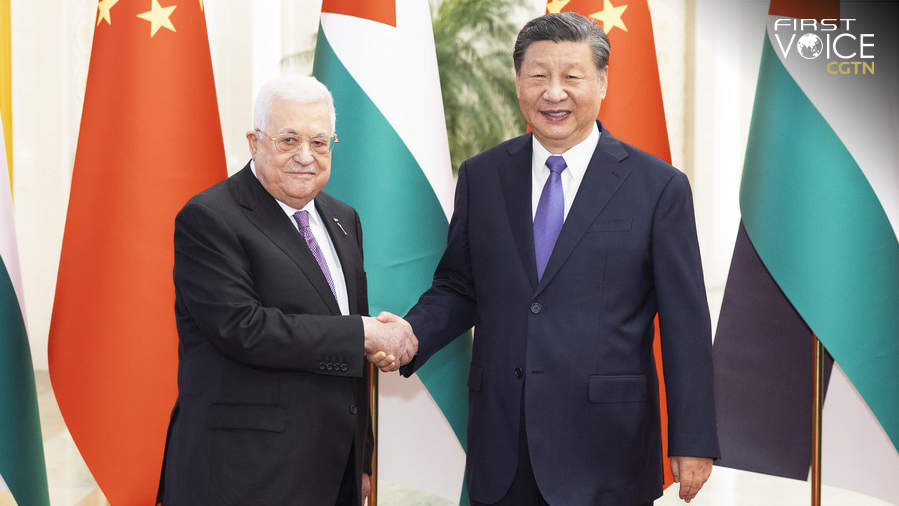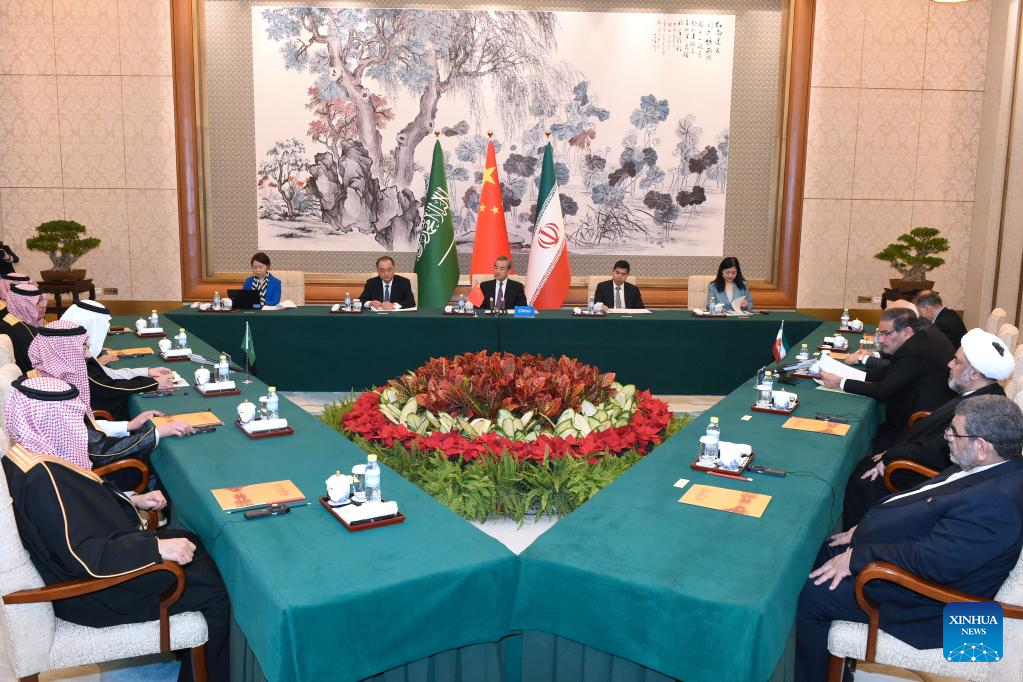
Editor's note: CGTN's First Voice provides instant commentary on breaking stories. The column clarifies emerging issues and better defines the news agenda, offering a Chinese perspective on the latest global events.
On June 14, Chinese President Xi Jinping held talks with Palestinian President Mahmoud Abbas in Beijing. They jointly announced the establishment of a strategic partnership between China and Palestine.
President Xi also put forward a three-point proposal for the settlement of the Palestinian question. It stipulates that the fundamental solution to the Palestinian question lies in the establishment of an independent state of Palestine that enjoys full sovereignty based on the 1967 borders and with East Jerusalem as its capital. Palestine's economic and livelihood needs should be met and the international community needs to step up development assistance and humanitarian aid to Palestine. And finally, it is important to keep in the right direction of peace talks.
This year marks the 35th anniversary of China-Palestine relations. China was early in its recognition of the Palestine Liberation Organization (PLO) and the State of Palestine. In 1965, a PLO office was set up in Beijing and treated as a diplomatic mission. China and Palestine formally established diplomatic relationships in 1988. The two sides signed a free trade agreement Memorandum of Understanding in 2018. And In 2022, trade volume between the two sides totaled nearly $160 million, an increase of 23.2 percent from 2021.
The Palestine-Israel conflict has been a focus of China's diplomatic efforts. In 2022, China's permanent representative to the United Nations Zhang Jun called on the international community to advance the two-state solution. The Palestine-Israel conflict has been on the UN agenda for over seven decades, and each day of inaction is a disservice to peace, a betrayal of justice, and a failure to the next generation, Zhang said.
It's nothing new to the world now that China is trying to forge peace between parties in conflict. Earlier in the year, China, Saudi Arabia, and Iran announced that the two Middle East countries reached a deal to resume diplomatic relations and reopen embassies and missions. China's mediation between these two rivals has been described by many as historic and surprising. Osama Danura, a Damascus-based Syrian political analyst, said in an interview that "We are talking about an effective presence of China for the first time in the history of this region as a patron of an understanding, or a disengagement of a strategic clash between two important regional countries."

Wang Yi, a member of the Political Bureau of the Communist Party of China (CPC) Central Committee and director of the Office of the Foreign Affairs Commission of the CPC Central Committee, presides over the closing meeting of the talks between a Saudi delegation and an Iranian delegation in Beijing, capital of China, March 10, 2023. /Xinhua
Wang Yi, a member of the Political Bureau of the Communist Party of China (CPC) Central Committee and director of the Office of the Foreign Affairs Commission of the CPC Central Committee, presides over the closing meeting of the talks between a Saudi delegation and an Iranian delegation in Beijing, capital of China, March 10, 2023. /Xinhua
Tunc Akkoc, Editor in Chief of Harici Media in Turkey, told Global Times that China's mediation efforts in the Middle East "have begun to pay off." Li Haidong, a professor at the Institute of International Relations at China Foreign Affairs University, said that when Saudi Arabia and Iran confronted each other, they backed different forces in Palestine. That created serious disunity in Palestine. With the reconciliation between Saudi Arabia and Iran, this problem might disappear.
China's approach to peace draws inspiration from ancient Chinese wisdom, as reflected in the following quotes: "The strong and the rich should not bully the weak and the poor" and "war-like state, however big it may be, will eventually perish." These profound words exemplify the values China upholds as it navigates the complex and unstable international order, seeking a path of peace and development.
What accompanies such efforts have always been the talks about great power rivalry. In this case, it's focused on China and the United States in the Middle East. Despite the ups and downs in their relationship, the United States and Israel have established strong security, economic and political ties. And given the complex geopolitical dynamics in the region, making an argument about China's challenge to the U.S.'s dominance wouldn't be hard if one cherry-picks the facts.
In the Global Security Initiative Concept Paper, it's stated clearly that the GSI aims to "eliminate the root causes of international conflicts, improve global security governance, encourage joint international efforts to bring more stability and certainty to a volatile and changing era, and promote durable peace and development in the world." "Humanity is an indivisible security community," the paper read.
This has been guiding China's actions. Force, intimidation, or domination will not provide long-lasting solutions to problems, especially not problems arising from a religious, or historical background intertwined with present-day geopolitical, economic, and security considerations. And in an international community that's so interdependent, one's security concerns would unavoidably impact others.
China has no interest in challenging the United States in the Middle East or anywhere. The United States' influence in the region is waxing and waning because of its political design and needs. No one can be blamed for its gradually cooling relationship with the region other than America's own choices.
Confucian thoughts stipulate that "a gentleman should ask harmony in diversity and should not do to others what he would not like himself." China is seeking harmony in this diverse world. And it's helping countries in the Middle East to do the same.
(If you want to contribute and have specific expertise, please contact us at opinions@cgtn.com. Follow @thouse_opinions on Twitter to discover the latest commentaries in the CGTN Opinion Section.)